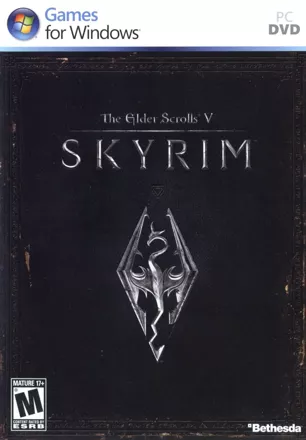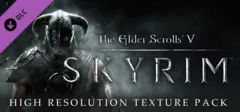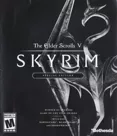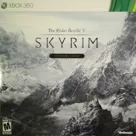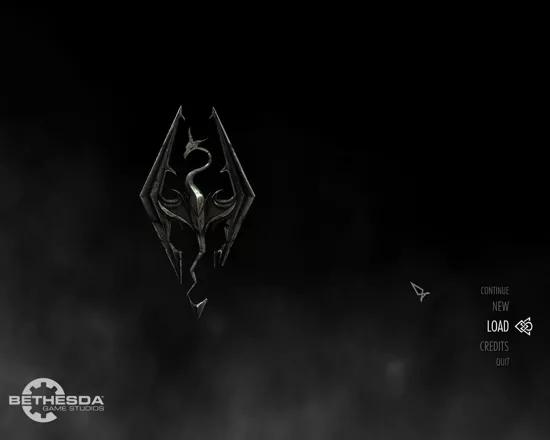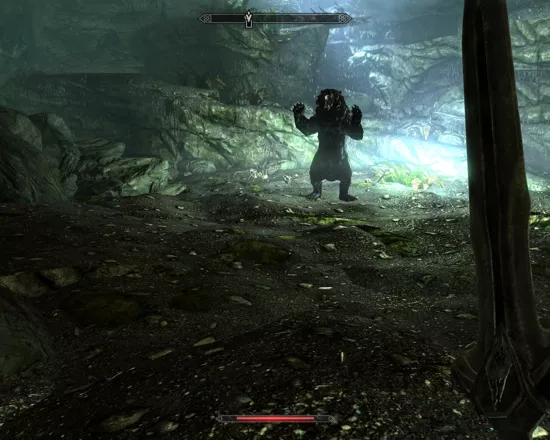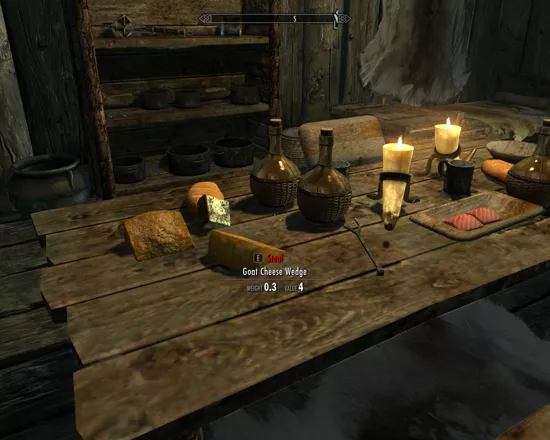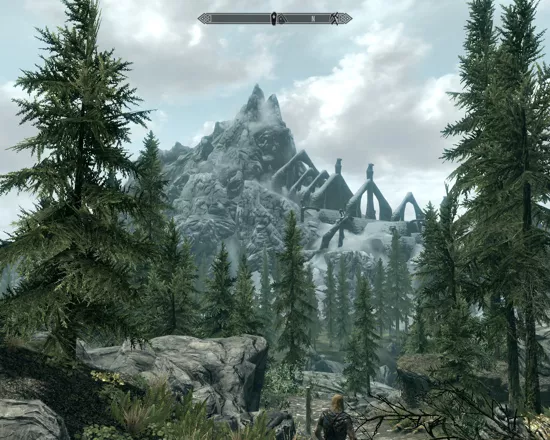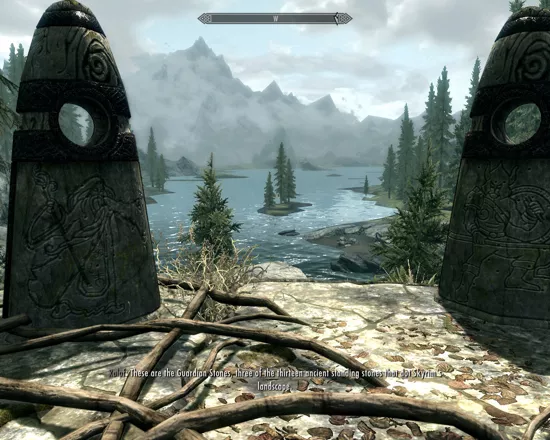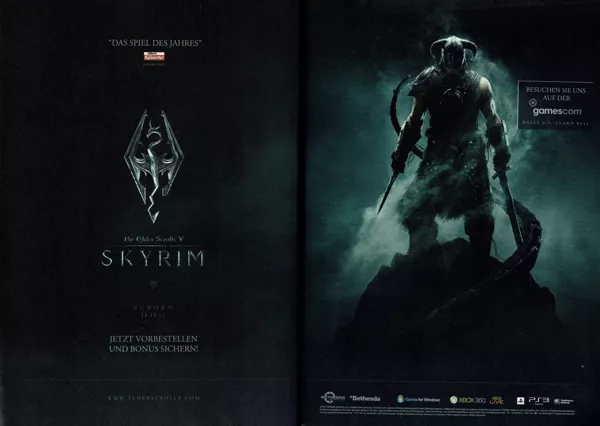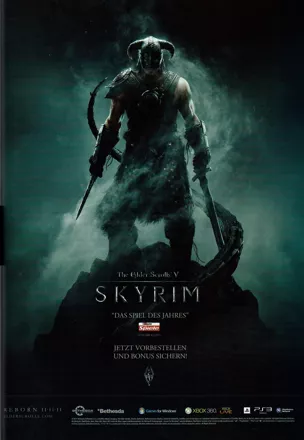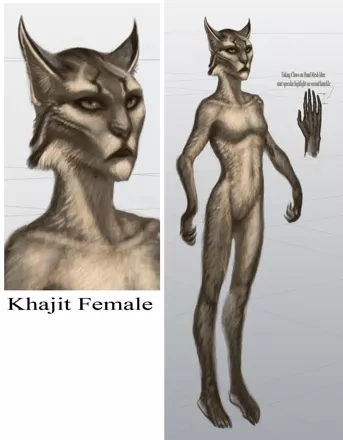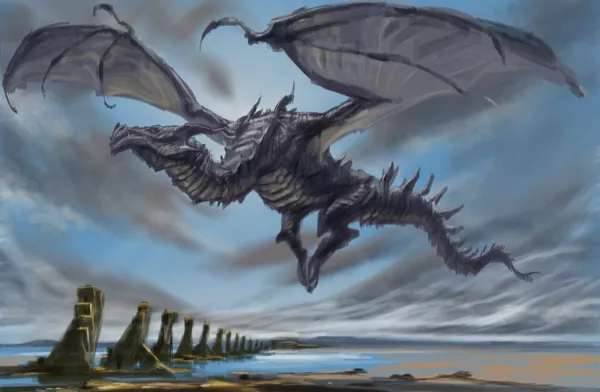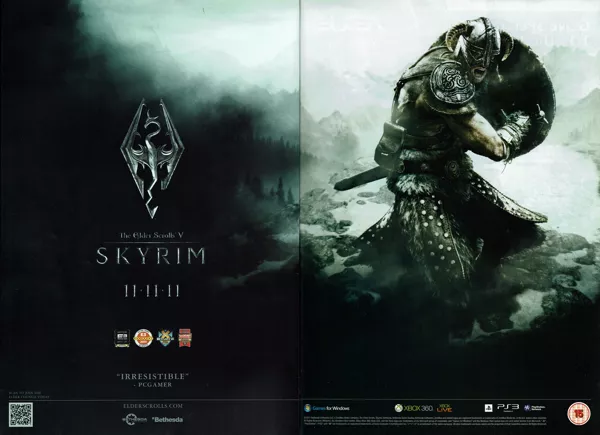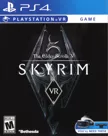The Elder Scrolls V: Skyrim
Description official descriptions
Two hundred years after the events described in Oblivion, the continent of Tamriel is in turmoil. The Emperor's throne remained without heir; the Blades, Empire's elite guards, have been disassembled; elven nations began capturing territory from the Empire. The assassination of the King of Skyrim, Tamriel's Northern-most province and home of the Nord race, led to a civil war between those who wish independence for Skyrim and those who wanted it to remain under the Empire's control.
A prisoner is brought to a small town, awaiting execution for alleged involvement with the Stormcloaks, a group that was founded by the king's assassin Ulfric Stormcloak. Just before the executioner's axe lands on the prisoner's neck, a dragon attacks the city, forcing most people to flee. The unexpected freedom leads the ex-prisoner into the snowy Skyrim, where the rumors of the dragon begin to circulate.
Like its predecessors in the Elder Scrolls series, Skyrim is an open-ended role-playing game with action-based combat. The player may explore the vast environments of Skyrim from either first- (default) or third-person perspective, being unrestricted in his or her travels and free to undertake any side quests in any order, or follow the main quest. It is possible to fast-travel to previously visited locations directly from the world map. The player can also opt to buy (or steal) and ride a horse.
There are ten races to choose from: Altmer (High Elves), Argonian (reptile people), Bosmer (Wood Elves), Breton, Dunmer (Dark Elves), Imperial, Khajiit (cat people), Nord, Orc, and Redguard. Each race has their own perks and limitations, such as Nord being resistant to cold, Khajiit being weak with magic, etc. Unlike the previous games in the series, the player cannot choose a class for the main character; rather, the latter evolves into any class-like combination gradually, according to the play style. When the protagonist reaches a new level, the player may increase his or her Health, Magicka, or Stamina and a new perk may be added to one of the skills. There are eighteen skills altogether, and each skill has several levels and perks which may be obtained. Most perks are only accessible after a certain level has been reached in said perk. For instance, in order to reach higher perks with Destruction, destructive spells must be leveled up. Skill levels can increase either through extensive use, skill books, or even paying for training from certain non-playable characters.
The game contains some features that were introduced in Fallout 3. Enemy level-scaling is done in a similar way, as opposed to the more intrusive system of Oblivion. The player may hire other fighters to follow the hero around and lend a helping hand in combat. Also, the lockpicking system of the previous installment has been replaced by the lockpicking methods of the recent Fallout games. Conversations with NPCs now occur in real time rather than "freezing" time as in Oblivion.
Players can craft, cook, or build any number of items depending on ingredients and skill levels. Alchemy allows players to make potions, Enchanting allows players to imbue armor and items with magical abilities (such as increasing the effectiveness of magic resistance), and Smithing allows players to either craft or improve weapons and armor. Smelting, tanning and cooking are also a part of this mix as well: Smelting is the skill of turning raw mined mineral ores into usable ingots for smithing; Tanning is the process of drying animal hides to make leather strips, useful in creating or improving armor and weapons; Cooking allows players to turn otherwise minimally useful food ingredients into much more beneficial meals.
Melee attacks can be performed using either two or one-handed weapons. Blocking reduces damage and allows for the opportunity to bash an opponent with a shield. Archery is also available for some ranged attacks, as is quite a bit of magicka. Each race also has a distinct magic-like power ability; only one power may be equipped at a time. For instance, a Nord power is to frighten enemies away for a while. New to the series is the Shout ability, which is a special power based on Dragon language. These require a special set of circumstances to unlock: first, the ancient words must be learned from Word Walls hidden all over Skyrim; secondly, they can only be activated by acquiring a dragon soul (from slaying a dragon).
Crimes may be committed by stealing, pickpocketing, murder or attacking innocent people, or even by trespassing. Generally this puts a bounty on the head of the player character, unless said character is quick enough to eliminate all witnesses. Fines and jail time, or a beat-down from authorities, are likely to ensue if the hero commits too many crimes or merely ends up getting caught. The protagonist can serve out his or her sentence on the jail bed, or pick the lock and escape; however, going to jail is likely to cause current skill progress to be lost.
As before, there are several groups, guilds, and the like that the player may encounter and join, each with their own advantages or disadvantages, each with their own views on the current events of the world, and each with their own quests. The abilities to become a werewolf or vampire are also present and have been somewhat streamlined: for instance, sunlight is not instantly deadly to vampires, and lycanthropy can be spread around.
Groups +
- 3D Engine: Creation Engine
- Animals: Cats
- Elder Scrolls series
- Fantasy creatures: Dragons
- Fantasy creatures: Elves
- Fantasy creatures: Goblins
- Fantasy creatures: Orcs
- Fantasy creatures: Trolls
- Gameplay feature: Alchemy
- Gameplay feature: Auto-mapping
- Gameplay feature: Blacksmithing
- Gameplay feature: Cannibalism
- Gameplay feature: Character development - Repetition
- Gameplay feature: Character development - Skill distribution
- Gameplay feature: Drowning
- Gameplay feature: Equipment quick slots
- Gameplay feature: Goldsmithing
- Gameplay feature: Horse riding
- Gameplay feature: House ownership
- Gameplay feature: Hunting
- Gameplay feature: Interior decorating
- Gameplay feature: Lock picking
- Gameplay feature: Mining
- Gameplay feature: Pickpocketing
- Gameplay feature: Survival cooking
- Gameplay feature: Transformation
- Games for Windows releases
- Games with nobility titles
- Green Pepper releases
- Middleware: Bink Video
- Middleware: FaceFX
- Middleware: Scaleform GFx SDK
- Physical Bonus Content: World Map
- Physics Engine: Havok
- PlayStation 3 Greatest Hits releases
- Protagonist: Female (option)
- Protagonist: Visually customizable character
- Software Pyramide releases
- Technology: FaceGen
- Video games turned into board / card games
- Xbox 360 Classics releases
Screenshots
Promos
Videos
See any errors or missing info for this game?
You can submit a correction, contribute trivia, add to a game group, add a related site or alternate title.
Credits (Windows version)
810 People (782 developers, 28 thanks) · View all
| Game Design |
|
| Game Director | |
| Lead Programmer | |
| Lead Artist | |
| Lead Designer | |
| Co-Lead Designer | |
| Production Director | |
| Lead Producer | |
| Audio Director | |
| Senior Producers | |
| Producers | |
| Lead Systems Programmer | |
| Systems Programming | |
| [ full credits ] | |
Reviews
Critics
Average score: 91% (based on 73 ratings)
Players
Average score: 3.9 out of 5 (based on 188 ratings with 8 reviews)
The Good
- Visually quite stunning.
- A lot of customization.
- Interface is pretty easy to understand.
- Strong writing.
The Bad
- Poor fighting mechanics.
- Useless shouts.
- Lackluster storyline.
- Boring scenery and world design.
- Doesn't feel epic in the slightest.
- Too easy.
- Too many inexcusable glitches.
The Bottom Line
I already reviewed this game, but I wasn't quite satisfied with the first version of it. Not only was it very rushed, but it also lacked some of the details I wanted to include and it was more positive than intended, so I figured I would give it another shot.
As the game starts we are treated on a little cart trip through Skyrim along with some other prisoners (we are going to make a running gag out of this, aren't we Bethesda? -_-). Turns out we were trying to cross the border and for some reason that is illegal and punished with a trip to Dead Row and no trial. As far as opening scenes go it works pretty well as it does a pretty good job at getting me in the mood to play it and it at least contains more action than that boring prison-scene at the start of Oblivion. So naturally you escape from the man with the axe and soon after you end up in the great outdoors, beautiful Skyrim.
After this intro I went straight for the main quest which involves an evil dragon who wants to cause an apocalypse and reset the world. I wasn't expecting to be dumped straight into a great storyline, but after like five hours of playing the "peak" of the whole storyline had already occurred. The first time I had to fight a dragon was amazing, it seemed so big and so challenging to slay a beast of this size, but this was two hours in and the rest of the story was rather boring. Every quest you got was either telling you to go somewhere and talk to somebody or to go into a copy & pasted cave and fetch something.
It was around this time I figured a little break would do me some good and I dived into one of the side-stories, namely the whole rebellion that is going on in Skyrim. It is the Empire versus the Nords and I wanted to get in on the fun, so I headed straight for the Nord city of Winterhelm (or was it Winterhold?), It was around this time that I started to notice that the world design is pretty boring, sure it is amazing at first when you first emerge from a cave and see an endless field of adventure before you, but there is just very little to do in this world and the moment you see your first mountain you have pretty much seen it all. Broken down into percentages Skyrim is: 5% city, 2% mountain and 100% snow. No matter where you look, you'll see f*cking snow.
Anyway I got to the city and for the first time since I started playing I was send to an area with different scenery. As exciting as it may sound, I am sad to inform you that the answer to your question is "ice" and well... more snow. Another thing I started to notice was that as I started looting more valuable treasure and I could carry more and more items the shops weren't doing a very good job at keeping up with my desire to sell them stuff. In Oblivion all shopkeepers had a maximum amount of money they could give you for each item, but here they only have a limited amount of cash to spend per day. This means that selling one treasure will likely bankrupt them instantly and by the time you find another vendor you'll already have found more treasure, creating a loop that you simply can't escape.
The whole rebellion sidestory was okay, but it heavily relied on assaulting cities and settlements. Again, just like with the dragon, this is amazing the first time, but after you do it five times in the same hour it starts to grow rather dull and predictable. This is a major problem in Skyrim, everything that could be an amazing setpiece is leeched of all impact because you will start doing it at level 3 and continue to do it for as long as you play with no tweaking in difficulty. Every dragon or city you take down feels like something that should have been the finally of the game, which instead of putting you in a constant state of amazement, makes you immune to its attempts to impress you by constantly doing the same elaborate tricks. It could have been paced better is what I am trying to say.
A big argument I keep hearing however is that the combat and leveling are the best they have ever been in the series, something that around this time started to strike me as rather odd. Leveling in Skyrim isn't in any way different from leveling in Oblivion and neither is training your skills. Sure, you no longer select primary and secondary skills, but that only allows you to level yourself in a corner if you only train skills like Alchemy and Smithing. "But now you can play however you want and that is what your character will get good at" doesn't make any kind of sense because that is always the case in every RPG. The fighting is for the most part okay and feels like it has remained unchanged, but this is the first time we actually get to fight big battles with both friendly and enemy NPC's. Sometimes you'd get lucky and some random guards would help you beat down a bandit in Oblivion, but in Skyrim there are a lot of organized attacks and they aren't as fun as you'd think. Been an archer and sneak combination I was pretty much forced into fighting with a friendly army during the rebel quests and this turned the combat into an uncontrollable mess where dozens of soldiers danced around each other and friends were hard to differentiate from foes.
After rounding up the rebel business I returned to the main quest just in time to finally see the game's most hyped, new feature. Using the Right Button you can unleash a shout that will have a magical effect on enemies and your surroundings. Wait what? Magical effect? You mean like a spell? Yes, I am dead serious, the shouts are a 1 on 1 copy of the magical spells every fantasy game has used since god knows long. You have shouts for shooting fire, ice, wind, becoming invisible and stopping time just to name a few, but is this the great feature everybody was hyped for? In the time it takes my character to shout some random gibberish I could have already opened the menu and equipped a magic spell that does the exact same thing.
I continued working my way through a few more dull caves and pretty good character dialog until I finally made it to the last boss, or so I though. Though technically a Round 1 of 2 the first fight with the big, bad dragon was an absolute nightmare. Not because it was hard, but because it was more glitched than Grand Theft Auto: San Andreas and Big Rigs combined. After dying once because I got a little too excited and forgot to watch my health, the boss just went into insanity mode. I couldn't inflict any damage on him with anything I had, not even my backup could do anything to harm the dragon who was casually spewing fire on us while we were putting enough holes in him to make a bunker fall apart. Eventually I solved the glitch and in my very next try he managed to get stuck in the scenery. Fantastic. What makes this so weird for me is that I can't seem to figure out how you can possibly cock up so badly that a boss becomes completely invulnerable? How did you get that programmed into the game? And while we are on the subject: Why didn't this get taken out in the two patches we have seen since the release of the game?
Anyway, I finished up the main storyline which I won't spoil for you, but after that I kinda stopped playing. While I accumulated a total of 500+ hours played in Oblivion, I don't even think I reached the 30+ hours that I got on Kingdom Hearts and Skyward Sword with this game. I tried getting into the Thieves guild questline, but yeah... lots of dark caves.
My main problem with the game is that everything it contains could potentially be very amazing, but because you see everything in the first five hours of playtime and then just continue to wallow in it, it takes away from how epic it could have been. Consider it has also been a while since Oblivion came out, I kind of wonder what all the time went into because it certainly wasn't the storyline or the bug fixing.
While Skyrim has received a lot of praise from the press, I don't think it deserves such awards as the Game of the Year from the Escapist, simply because personally trying to enjoy this game felt a lot like clinging to the nostalgia I felt for Oblivion. I am not sure if this is the case for everybody, but the way I see professional websites handing out 10/10's makes me feel like these people weren't enjoying Skyrim as much as they forced themselves too and that is a pretty depressing thought.
If you are a die-hard fan of Oblivion than you may be able to see past the many problems of Skyrim, but everybody else will just see it for the mess it actually is. It is a big realm filled with a lot of copies of the same three areas and that occasionally pisses itself and dies. All-around mediocrity.
Xbox 360 · by Asinine (957) · 2012
Bethesda's very first masterpiece
The Good
This is it. Bethesda had finally done their homework by listening to their fans, researching into what worked and not thus far in this most complicated genre of all, what made Morrowind so much deeper and more memorable than Oblivion -- and they released what is probably their best and most consistent game yet. All things considered, it is also among the best role-playing games ever made. But Bethesda needed all their blood, sweat and tears, all the hard experience from Arena to Fallout 3 to pull this feat.
Skyrim is best described as a distinctive, homogeneous experience in a dynamic open world. I think it is best played in huge chunks, in a wide-eyed, semi-meditative state, which is a prerogative of open-world RPG's, this pinnacle genre in video gaming. I'll try to break down the best components of this experience:
-
As much as the vast open-world formula permits it, Bethesda creates free-roaming NPC's with true characters -- even if only some of them really stick out and even fewer are memorable. As expected, characters who are relevant to the main plot are fleshed out the most: Ulfric Stormcloak, his second-in-command Galmar, Esbern, and our clandestine associate Delphine, perhaps most of all. What is great though is that some of the less important characters end up being quite memorable too: Ancano, the mysterious Thalmor emissary in the College. Madanach, the disgruntled leader of the Forsworn. Kodlak Whitemane, the Companions' elderly foreman who even writes a lengthy diary that we can discover. And when I finally lost my loyal sidekick Lydia in some dungeon after days of doing quests together, I felt a genuine sense of emotional loss (even if she wasn't one of the more memorable NPC's), a very rare feeling in computer games.
-
Politics are realistic, complex, convoluted, frustrating, as they should be. The internal and external struggles of the various factions are not sugarcoated for the player, it's all laid out as it is, and we need to figure our own way around the relations. The Empire, the Thalmor, the Stormcloaks, the Forsworn, the Blades, the Greybeards -- all their destinies are intertwined in a realistic way, all have their respective agendas that the player needs to figure out with minimal to no hand-holding. The fact that Skyrim's political landscape is not simplified for easier digestion is one of my favorite aspects of the game. It's a subtle, mature feature not advertised with hype, yet it helps the immersion tremendously.
-
Many of the conversations are deep and involving -- for a Bethesda game. They are excellently written and are often quite long, which is taken for granted from some other developers like Obsidian, but it's a very pleasant surprise coming from this developer who were once notorious for their drone-like NPC's and deadpan dialogues. The crucial negotiation scene in High Hrothgar reminded me of the Castle Never trial scene in NWN2, as it achieved the same kind of tension, gravity and drama, which is awesome for a mostly non-scripted open-world role-playing game. Skyrim is probably the very first open-world RPG that lives up to the challenge posed by Obsidian's offerings in terms of dramatization and tension.
-
Many of the quests are creative, exhilarating and unorthodox. The main plot line is haunted by a sense of wonder and is graced by many (scripted) scenes that are bound to be remembered as some of the most memorable scenes in gaming: the first dragon hunt at the Whiterun guard tower; the reading of the Elder Scroll on the mountaintop; the dragon trapping in Dragonreach; the greeting and cheering of a dozen flying dragons after the final battle. And Blackreach, a vast, eerie, otherworldly cavern with abandoned structures is one of the top five ingame locations I have encountered in a game EVER. Outside of actual real-life adventure travel, it is probably only open-world RPG's that are capable of achieving this sense of wonder, since it presupposes the element of boundless exploration in an intriguing region. It also presupposes a capability of sensing wonders in the players themselves, something that many jaded gamers of today seem incapable of -- in real life or virtual.
-
There are about 330 books in Skyrim, and while I haven't read all of them, I took the time to read quite a few. This is part of why the game is a triumph: not one of the books is shallow, boring or badly written. Yes, I know that many were already included in earlier Bethesda games, and most of them are brief 3-4 page treatises. Yet all things considered, this has to be one of the first games that does take its own book reading feature very seriously. You can spend several hours just browsing through the ingame books and not be bored. What's even better is the way the books' material ties in directly with the actual gameplay. In most RPG's, ingame books are disconnected from the actual gameplay. Here, they complement it. You can read a lot about Alduin or the Wolf Queen, for instance, and later you get to meet both of them.
-
Some towns are architecturally awesome and feel alive with daily bustle. Markarth and Whiterun, especially. I liked the vibe of Solitude and Riften as well. Again, this would not be such a feat in a "hands-off", closed-world RPG, but the fact that even towns are awesome and realistic in Skyrim makes the end product all the more irresistible.
So the game is not only huge and open-ended, but it includes characters, quests, books and towns with the high quality of smaller scale closed-world games: it's a culmination of the best of both worlds, not unified successfully until now.
The Bad
I finally got fed up with all of it around the 100 hours mark. That's quite a feat as the vast majority of contemporary RPG's stop being interesting (and usually run out of material) before 40-50 hours of gameplay. At this point, I couldn't stand to endure another bandit-infested fort, another Nord village, another steampunk Dwemer ruin, another mission update and so forth. It was too much, because Skyrim's world is very homogeneous. You'll find the exact same non-scripted stuff at the southern tip as on the icy northern reaches. Thus Skyrim's geographic and thematic realism is a mixed blessing; it can get grating, repetitive, predictable. But it's a long enjoyable ride until that point.
The skill system is radically simplified and streamlined, clearly the influence of mainstream console gaming (which itself is a blight on role-playing games). Much had been said about the classless system and the lack of skills like acrobatics. While all this can be interpreted as a dumbing down of game mechanics, I found that it doesn't hinder immersion, in fact maybe it promotes it: much like on a real-life adventure trip, in Skyrim all you need to really worry about is the actual surrounding environment instead of stats and dice rolls.
The Skyrim province and culture is quite blatantly inspired by Medieval Scandinavia, right down to the names and the looks of the people. I wish Bethesda took a more original approach than just "vikings on steroids".
I've used the already-famous SkyUI mod almost from day one, because I found the original UI insufferably dumbed-down and console-y. Its inventory management was so simplistic and awkward, it felt like it belongs to a lesser game.
Oh, the bugs. The 1.4 patch (as of early 2012) still failed to squash a number of serious show-stoppers. But us open-world RPG fans learned years ago that a major game is considered an "immature" release until it lives to see its first or even second birthday. By then the inevitable barrage of official and unofficial patches will have probably helped it to thoroughly playable status. (VTM: Bloodlines and Gothic 3 are prime examples of why it is useful to wait at least 2 years after initial release.) Judging by that, I'm sure I'll return to Skyrim around 2014 for another playthrough.
The Bottom Line
"We’re checking [Skyrim] out aggressively. We like it. We’re big admirers of [Bethesda] and the product. We think we can do some wonderful things," says Bioware co-founder Ray Muzyka. That has to be the ultimate praise, even if it comes from an increasingly uninspired developer that has spent the last few years spiraling down from failure (Mass Effect 2) to failure (Dragon Age 2) to sellout (The Old Republic). Here's hoping that Skyrim will change the development path of RPG's for the rest of the decade, bringing back both Obsidian and Bioware to the right track.
Let's face it: Skyrim is an important moment in game history. Its success and greatness prove to the entire industry that hardcore, epic games are not only actually marketable, they are plain cooler than anything the more casual Wii/PS3 market can come up with. They are even capable of entering popular culture if the quality and marketing is right. This is going to be a great decade for hardcore role-playing game fans.
Windows · by András Gregorik (59) · 2013
По суті, Скайрім - це така екшн-РПГ пісочниця, яка живе за рахунок модів.
The Good
Атмосфера,
Імерсивність,
Бойова система,
Моди,
Дракони,
Пересування верхом на коні.
The Bad
Нецікаві квести,
В діалогах недостатньо вибору для відігравання ролі,
Варіативність на низькому рівні,
The Bottom Line
Команда Тода Говарда завжди старається наповнити свої ігри максимальною кількість контенту та зробити їх настільки масштабними, наскільки їм це позволяє бюджет та технології, але якість цього контенту завжди під питанням. Це ігри, які багатьом подобаються, але водночас їх мало хто проходить до кінця. До того ж, без модів Скайрім вважається дуже сирим навіть серед фанатів.
Windows · by Oleh Wixel · 2023
Discussion
| Subject | By | Date |
|---|---|---|
| New animations | Indra was here (20756) | Feb 11, 2013 |
| Some thoughts about Skyrim | The Fabulous King (1332) | Jan 23, 2012 |
| Low sound? | Unicorn Lynx (181780) | Dec 20, 2011 |
Trivia
Awards
- 4Players
- 2011 – Best Game of the Year (Readers' Vote)
- GameSpy
- 2011 - Game of the Year
- 2011 – RPG of the Year
- GameStar/GamePro (Germany)
- 2011 - PC Game of the Year (Readers' Vote)
- 2011 - Console Game of the Year (Readers' Vote)
- 2011 - PC RPG of the Year (Readers' Vote)
- 2011 - Console RPG of the Year (Readers' Vote)
- 2013 – Community Favourite of the Year (Readers' Vote)* PC Games (Germany)
- Issue 01/2012 - Best Game in 2011 (Editors' Choice, together with Batman: Arkham City and Portal 2)
- Issue 01/2012 - #2 Best RPG in 2011 (Readers' Choice)
- Issue 01/2012 - #2 Best Game in 2011 (Readers' Choice)
- Issue 01/2012 - #3 Surprise in 2011 (Readers' Choice)
- Issue 01/2012 - #2 Best Graphics in 2011 (Readers' Choice)
- Issue 01/2012 - #2 Best Sound in 2011 (Readers' Choice)
- Issue 01/2012 - #2 Best Sound in 2011 (Readers' Choice)
- Steam Awards
- 2016 — The 'Test of Time' Award — Won
- Xbox 360 Achievements
- 2011 - Game of the Year
- 2011 - Best Original Score
Analytics
Upgrade to MobyPro to view research rankings!
Related Sites +
-
FAQs, Walkthroughs and Guides for Skyrim
from GameFAQs.com -
Skyrim - The Elder Scrolls Wiki
The Skyrim wiki website on wikia.com -
Skyrim Walkthrough
includes news, guides, quest information, mods -
The Elder Scrolls V: Skyrim Hints from UHS - Not Your Ordinary Walkthrough
includes tips & tricks, strategies and guides for the game -
Week of Madness
A gimmick diary with a Skyrim packed full with mods. Written by Richard Cobbett on PC Gamer (Part 1/5) -
Wikipedia: The Elder Scrolls V: Skyrim
Article about the game in the open encyclopedia
Identifiers +
Contribute
Are you familiar with this game? Help document and preserve this entry in video game history! If your contribution is approved, you will earn points and be credited as a contributor.
Contributors to this Entry
Game added by ResidentHazard.
Additional contributors: Jeanne, Havoc Crow, Yearman, Patrick Bregger, Kennyannydenny.
Game added November 16, 2011. Last modified March 14, 2024.
